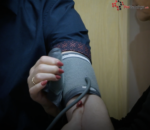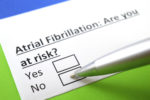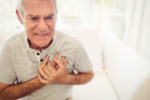Blood pressure testing is a simple process that anyone can do and there are many low-cost blood pressure monitors available.
Recognising Heart Attack Symptoms
Common signs and symptoms include:
- Chest discomfort or pressure, often described as a squeezing sensation
- Pain that may radiate to the arms (especially the left arm), back, jaw, throat, or stomach
- Shortness of breath
- Cold sweat
- Nausea or vomiting
- Light-headedness or dizziness
- An overwhelming sense of anxiety or impending doom
It’s important to note that symptoms can vary between individuals, and some may experience mild or atypical signs. For a detailed overview of heart attack symptoms, refer to the Heart Attack page.
Immediate First Aid Response
If you suspect someone is having a heart attack:
- Call Emergency Services: Dial 999 or 112 immediately to request an ambulance.
- Encourage Rest: Help the person to sit down and rest in a comfortable position.
- Administer Aspirin: If the person is not allergic and has no contraindications, provide a 300mg aspirin tablet to chew slowly.
- Monitor Vital Signs: Keep a close watch on their breathing and consciousness levels.
- Prepare for CPR: If the person becomes unresponsive and is not breathing normally, commence cardiopulmonary resuscitation (CPR) immediately. For guidance on performing CPR, visit the Adult CPR page.
For a visual demonstration of the appropriate body position during a heart attack, refer to the Heart Attack Position video.
Preventing Heart Attacks
To reduce the risk of a heart attack:
- Adopt a Heart-Healthy Diet: Incorporate plenty of fruits, vegetables, whole grains, and lean proteins into your meals.
- Engage in Regular Physical Activity: Aim for at least 150 minutes of moderate-intensity exercise per week.
- Avoid Smoking: Seek support to quit smoking, as it significantly increases heart attack risk.
- Manage Stress: Practice relaxation techniques such as mindfulness or yoga to reduce stress levels.
- Regular Health Check-ups: Monitor blood pressure and cholesterol levels and manage conditions like diabetes effectively.
Further Resources
Expand your knowledge of heart health and emergency response:
- Effective CPR Techniques
- Using an Automated External Defibrillator (AED)
- Understanding Angina and Its Management
- The Recovery Position: How and When to Use It
For comprehensive first aid training, consider enrolling in our First Aid at Work Annual Refresher (VTQ) course.





